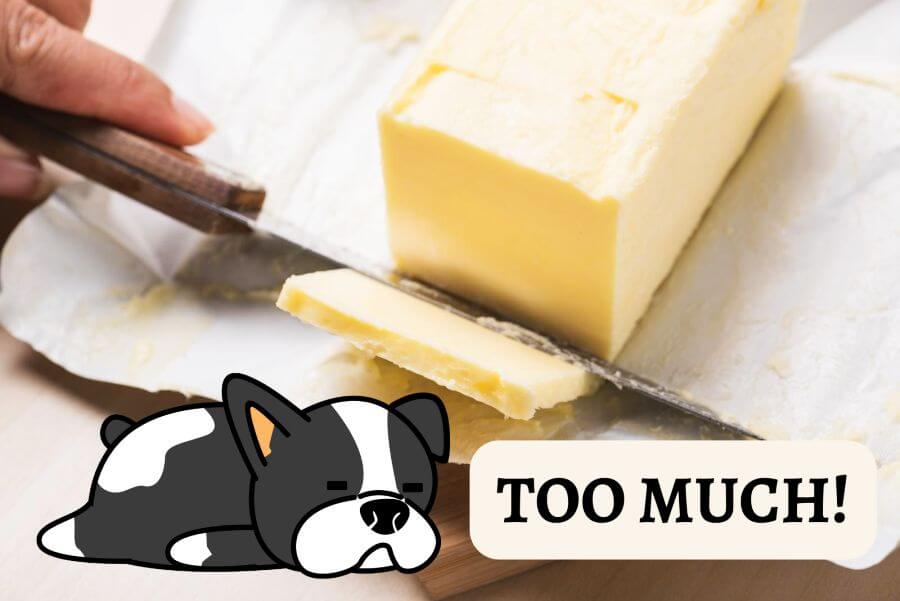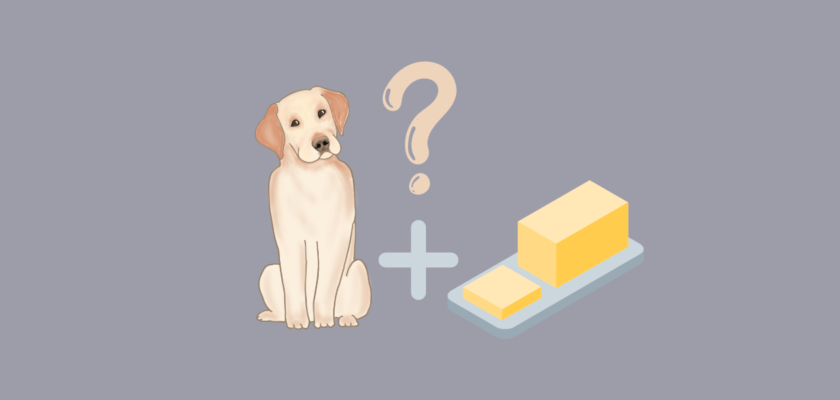Key Takeaways
- Dogs shouldn’t eat butter because it will make them exceed their recommended fat intake for the day, leading to weight gain ❌
- Licking a small amount of butter on occasion shouldn’t hurt a healthy dog, so don’t worry too much if your pup gets into some ✔️
- Eating a whole stick of butter (or a substantial part of it) can be dangerous – take your pup to the vet if this happens ⚠️
- Some butters may contain additives that haven’t been tested for safety when it comes to dogs ⚠️
A bit of butter might not harm your pooch, but when is it too much for a dog’s stomach? Join the debate about butter and dogs. Ultimately, the decision whether to give your dog butter is up to you, but it’s important to be aware of both the benefits and risks associated with it.
Is Butter Bad for Dogs? Potential Risks
Can dogs eat butter? Alright, let’s cut to the chase! Feeding your dog butter is like playing with fire. You see, the high fat content in butter can set your pup on a collision course with pancreatitis – yep, the same nasty condition that can plague humans who overindulge in fatty foods.
Our furry pals just can’t break down fats as efficiently as we can. The result? A flood of fatty acids coursing through their bloodstream, forcing the pancreas to work overtime churning out enzymes. But there’s a dark side: these enzymes end up turning fats into cell-damaging free radicals, sparking inflammation, and even threatening your dog’s life!

But wait, there’s more! Butter’s not only packed with saturated fat – a notorious culprit in obesity and heart disease – but it’s also loaded with lactose. And if your dog’s lactose intolerant, get ready for a roller coaster of digestive mayhem, from diarrhea to vomiting. So, think twice before treating your canine companion to that buttery snack!
Quick Tip
Peanut butter is a healthier (occasional) snack for dogs! In addition to fat, it’s rich in protein and doesn’t contain any lactose. It’s also a source of vitamin B6. Keep in mind that peanut butter is also calorie-dense, so we’re talking 1–2 tablespoons weekly as a treat at most.
Can a Bit of Butter Be Good for Dogs?
Can dogs eat butter? There are also potential pros of feeding butter to dogs. Butter is a great source of nutrients, including fatty acids, proteins, and vitamins A, D, and E. It can help improve your dog’s skin and coat health.
However, not all butters are created equal. Some butters may contain additives that haven’t been tested to see if they’re safe for dogs. Choose a stick that’s made with all-natural ingredients.
Your Dog Ate a Stick of Butter? What You Should Do
Yikes! Your pup just wolfed down a whole stick of butter? Quick, grab the phone and ring up your trusty veterinarian! While butter isn’t exactly toxic to our canine companions, that’s a heck of a lot for their little tummies to handle. As a dairy product, butter’s chock-full of cholesterol and saturated fat, which might just kickstart a nasty case of pancreatitis in some doggos.
Don’t panic just yet, though! Your vet’s got your back, ready to recommend whether or not your furry friend needs any medical intervention. And in the meantime, keep those peepers peeled for any changes in your dog’s behavior, especially if it looks like they’re in distress. Oh, and brace yourself for some, uh, messy bathroom breaks – diarrhea’s pretty much guaranteed!
How Much Butter Can a Dog Eat?
Well, the answer isn’t one-size-fits-all. You see, each pup is unique; some can handle a smidgen of butter without a fuss, while others end up with upset tummies or worse after even a tiny taste. To play it safe, have a chat with your vet before letting Fido lick the butter knife.
As a general rule of thumb, a teensy bit of butter (around 1 teaspoon for every 20 pounds your dog weighs) shouldn’t cause any trouble – but that’s a treat for just once or twice a week, tops! Remember, butter’s loaded with cholesterol and fat, making it a potentially risky snack for our four-legged friends. So, when in doubt and asking „Can dogs eat butter?”, trust your vet to steer you right!
Did You Know?
A tablespoon of butter contains 12 grams of fat, which is the recommended daily fat intake for a 30-pound dog! And they’re getting that already from their dog food, so it’s really best to skip the butter.
Is Margarine Safe for Dogs?
Just like butter, margarine is a source of fatty acids, proteins, and vitamins. It also contains antioxidants, which can help protect your dog’s cells from damage. In addition, it can be a good source of calcium and vitamin D, both of which are important for bone health.
Again, though, margarine will increase the cholesterol levels of your furry pal (although it’s probably healthier than butter) and will spike up the fat. It shouldn’t be given to dogs that are overweight or with a bad heart condition.
Can Dogs Eat Butter? Let’s Wrap it Up!

While it’s tempting to give our dogs a taste of the buttery goodness we enjoy, it’s significant not to feed them this high-fat food. Butter is bad for dogs and can lead to health problems like obesity and pancreatitis. However, peanut butter can be a healthier alternative that provides your pup with essential nutrients. So next time you reach for the butter cookies, read our article again: “Can dogs eat butter?”
Similar Posts:
- Can Dogs Eat Almond Butter? Pros and Cons of Nut Butter in a Dog’s Diet
- Can Dogs Eat Peanut Butter? How Much Peanut Butter Is Safe for Dogs?
- Can Cats Eat Peanut Butter – How Much Is Safe for Them?
- Can Dogs Eat Sunflower Seeds or Shells?
- Can Dogs Eat Granola? Are Granola Bars Safe for Dogs?
- Can Dogs Eat Peanuts? Are They Safe for Dogs?
- Can Dogs Eat Cheese? Is It Safe for Dogs?
- Can Dogs Eat Doritos? The Problem with Dogs Eating Chips

